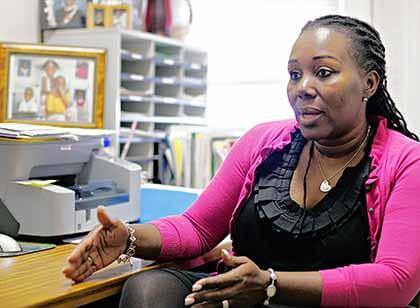By Howard Koplowitz
On Jan. 11 of last year, life at the offices of the Cambria Heights organization Haitian Americans United for Progress went on as normal: holding ESL classes, helping immigrants find resources and receiving counseling for the Haitian community.
That routine was shaken the next day, when a 7.3-magnitude earthquake rocked Haiti, and HAUP became the place in Queens where Haitians would go to contact missing loved ones, connect with aid organizations and get information from the poorest country in the Western Hemisphere.
“From Jan. 12, we have a whole new mandate,” said Elsie Saint Louis Accilien, HAUP’s executive director. “We’re responsible for a whole new population. We have to really be more involved in Haiti.”
HAUP is being housed by an organization in Haiti and registered to provide support and technical assistance to groups on the ground in the Caribbean nation.
“We’re trying to make sure we have a community-based model,” Accilien said. “Haiti couldn’t survive without little people looking out for little people.”
With the passing of time, the urgency to continue to respond to those affected by the earthquake has waned and Haitians are not getting the support they need, Accilien said.
“Unfortunately, a year later we’re still saying we’re in a state of emergency,” she said, noting people are still living in tents and tens of thousands of tons of rubble has yet to be cleared.
“There’s blame to go around,” Accilien said. “There could’ve been a more coordinated effort in the reconstruction of Haiti.”
Accilien has been to her homeland twice since the quake, once in May and another trip in October.
“Life has resumed. Schools have reopened. People are back to work,” she said. “Life has gone on in what is the new normal. There is life in Haiti. Haitians have moved on with their lives. Haiti has just not sat still for a year.”
While Haitians in America have taken in their relatives dislocated by the quake, Accilien said households have experienced strain in helping their loved ones and cannot continue to financially support them.
“We’re fending for ourselves with very little assets and support,” she said of HAUP, noting that the group has given out food vouchers, MetroCards and clothing through the United Nation’s Hope and Healing Fund.
HAUP, at 221-05 Linden Blvd. in Cambria Heights, does case management, including counseling and providing access to education and health services.
It has been referring Haitians to shelters, food pantries, Catholic charities and organizations that provide clothing.
During Accilien’s October visit to Haiti, she observed “very peaceful people” who watched as SUVs rolled through tent cities.
“You get to see the Haitian people in a different light,” she said. “The sense of pride, the sense of country and the sense of self.”
She recalled how HAUP’s staff helped the city’s Haitians find relatives as they were on their own quest to reach out to their families.
Accilien said the country is not defined by the earthquake and that Haitians are hopeful people but contended the media could do a better job in portraying the Haitian people.
She said the media could have been more responsible, for instance, when it documented how looters ran rampant in the days after the earthquake, saying they had no choice if they wanted to survive.
“I think it’s important that Haiti does not remain in the archives of the media,” she said. “I think the media is well-positioned to effect changes that Haiti needs.”
While Accilien said organizations did not do an adequate job in helping the people of Haiti, she said the ultimate responsibility will be shouldered by the Haitian people.
“In the end, it’s going to be us to clean up our country,” she said. “Hope did not die with Jan. 12. People died with Jan. 12. Buildings fell on Jan. 12. We are still the same people.”
Reach reporter Howard Koplowitz by e-mail at hkoplowitz@cnglocal.com or by phone at 718-260-4573.



































